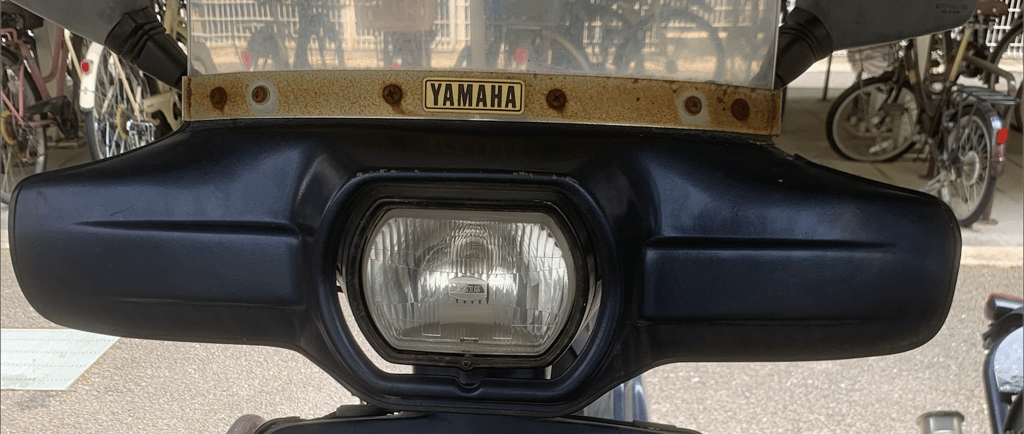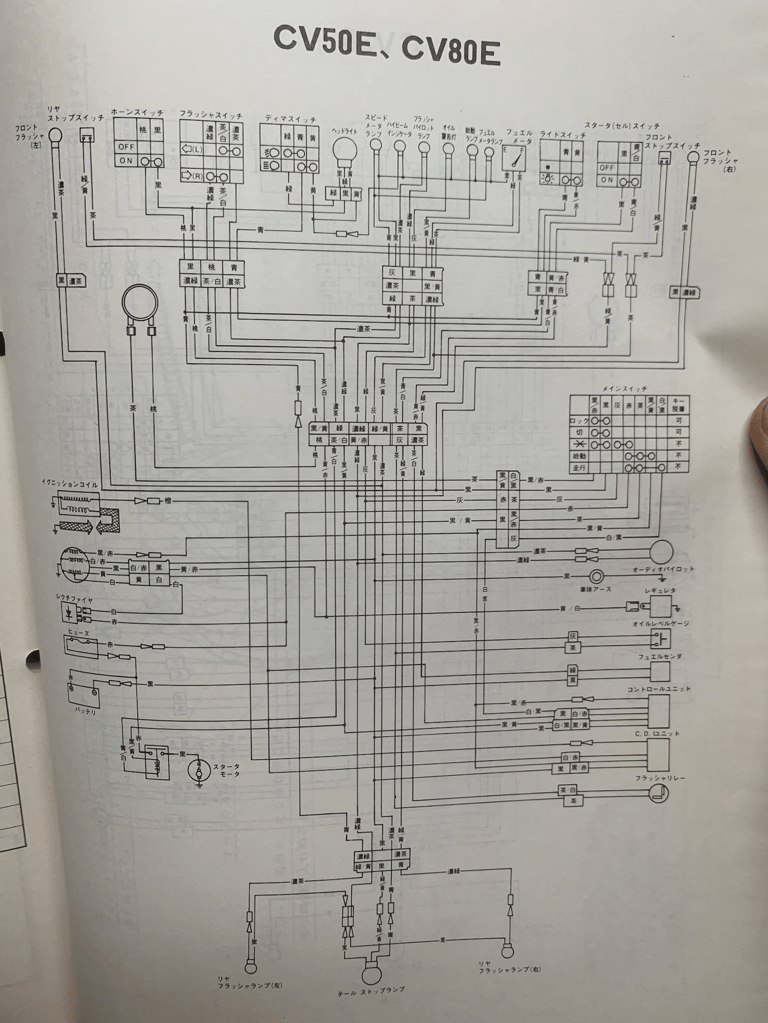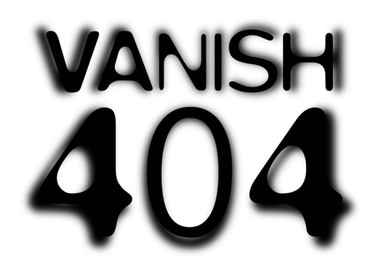The Gaijin's Guide to Motorcycle Enlightenment: How Being Kanji-Illiterate Saved My Soul (And My Wallet)
Blog post description.
7/6/20254 min read


The Problem With Being Fluent in Bullshit
Here's the uncomfortable truth nobody wants to admit: most of us have become fluent in exactly one language—digital anxiety. We can parse Instagram stories faster than a Tokyo salary man catches the 7:23 Yamanote Line, but ask us to fix something with our actual hands? To solve a real problem that doesn't involve WiFi passwords? We're screwed.
I learned this the hard way when I moved to Japan and discovered that my smartphone superpowers were utterly useless when faced with a simple motorcycle listing on Mercari written entirely in kanji I couldn't read.
Plot twist: This handicap became my superpower.
The Mercari Motorcycle Roulette
Picture this: You're scrolling through Japanese auction sites, completely kanji-illiterate, relying purely on pictures and your gut instinct to buy a motorcycle. It's like playing Russian roulette, except instead of bullets, you're gambling with rusty exhaust pipes and suspicious engine noises.
But here's where it gets beautiful—when you can't read the seller's elaborate excuses about "minor cosmetic issues" or "recently serviced" (translation: hasn't run since the Heisei era), you're forced to become a detective. You zoom in on every pixel, study reflections in chrome, analyze the background for clues about the owner's garage hygiene.
This is problem-solving in its purest form.
No clickbait articles titled "7 Red Flags When Buying Used Motorcycles (You Won't Believe #4!)" Just you, some blurry photos, and the ancient human skill of pattern recognition that we've nearly educated out of ourselves.
Case in point: I once bought a Yamaha Beluga (CV50E) purely because the seller included a photo of the wiring diagram. Could I read a single kanji character on that beautiful, incomprehensible schematic? Hell no. But something about those clean lines, those organized connections, that methodical Japanese engineering poetry told me more about the previous owner than any Google-translated description ever could.
(Yamaha Beluga CV 50E schematic / ヤマハ ベルーガ CV 50E の回路図)
The Therapy You Didn't Know You Needed
Forget meditation apps. Forget mindfulness courses. Want to know what real presence feels like? Try kick-starting a 1980s Honda CB400 that you bought from a guy whose name you can't pronounce, using instructions you can't read, while your neighbors judge you in three different dialects.
This is where healing happens.
Not in the sanitized, algorithm-optimized wellness content that floods your feed, but in the honest-to-god frustration of trying to understand why your motorcycle makes that weird clicking sound when you turn left. There's something profoundly therapeutic about problems that have actual solutions—solutions that don't require updating your privacy settings or clearing your browser cache.
The Joy of Analog Problem-Solving
When was the last time you fixed something without Googling it first? When did you last solve a problem using only your hands, your brain, and maybe a rusty toolkit from the previous century?
Every used motorcycle purchase becomes a treasure hunt. That unmarked switch on the handlebars? Mystery feature. The previous owner's jerry-rigged solution held together with zip ties and prayer? Engineering poetry. The wiring diagram that looks like abstract art because you can't read the labels? Pure meditation.
I've spent hours staring at that Beluga schematic, tracing wire paths with my finger like a monk following prayer beads. The kanji might as well be ancient Sanskrit, but the logic is universal. Current flows from here to there. This connects to that. The bike doesn't care if you can read Japanese—it only cares if you can follow the path.
This is what we've lost to the smartphone age: the profound satisfaction of figuring things out without a tutorial, without a subreddit, without asking Siri. Just you, a diagram that might as well be hieroglyphics, and the ancient human superpower of pattern recognition.
Why Society Needs More Kanji-Illiterate Gaijin with Motorcycles
Here's the disruptive truth: we've created a generation of people who can optimize their LinkedIn profiles but can't optimize their actual lives. We can debug code but can't debug our own decision-making. We can troubleshoot WiFi connections but can't troubleshoot our relationship with reality.
The public benefits of motorcycle-induced digital detox:
People who spend their weekends elbow-deep in carburetors instead of lost in comment sections become:
Better at actual problem-solving (the kind that matters)
More patient with physical-world timelines (things take time, shocking!)
Less susceptible to manufactured outrage (hard to care about Twitter drama when your bike won't start)
More connected to their communities (you'll meet every mechanic within a 50km radius)
Generally happier (endorphins from accomplishment > dopamine from notifications)
The Mercari Wisdom
Every successful bid on a sketchy motorcycle listing is a small victory against the algorithm. Every engine that actually starts is proof that sometimes you don't need to read the fine print—you just need to trust your instincts and be prepared to get your hands dirty.
That Beluga wiring diagram taught me more about trust than any self-help book ever could. When you can't read the labels, you have to trust the logic. When you can't Google the answer, you have to trust your ability to figure it out. When you're holding a multimeter and staring at a junction box full of wires labeled in a language you don't speak, you learn to trust that electricity follows the same laws whether you're in Tokyo or Toledo.
This is what disruption actually looks like: not another app promising to revolutionize your productivity, but the radical act of being okay with not knowing everything, of being comfortable with uncertainty, of finding joy in the process rather than obsessing over the outcome.
The Real Revolution
While everyone else is trying to hack their way to happiness through biohacking and life optimization, the real revolution is happening in the garages and parking lots of Japan, where foreigners who can't read the warning labels are discovering that the best way to upgrade your life isn't through your phone—it's through your hands.
So here's my challenge to you: Find something analog. Buy something you can't fully understand. Get comfortable with not knowing. Whether it's a motorcycle, a pottery wheel, or just a conversation with a neighbor whose language you're still learning.
The algorithm doesn't have all the answers. Sometimes the best solution is to turn off the screen and turn on the engine.
Ready to vanish from the digital noise? Start with something that makes actual noise. Your future self will thank you—probably while changing spark plugs at 2 AM, cursing in two languages, and loving every minute of it.


